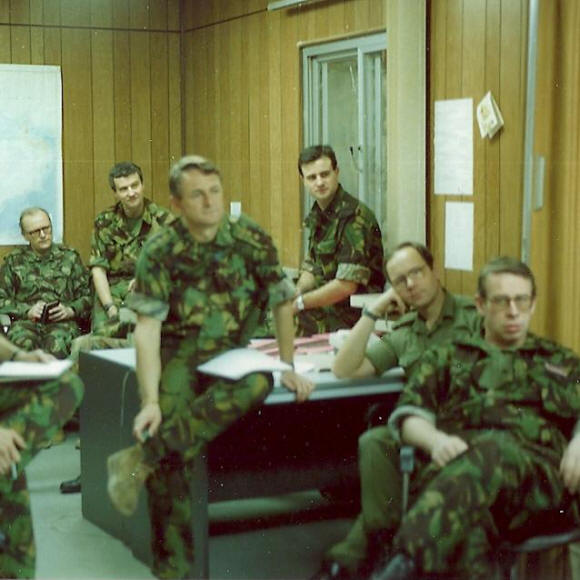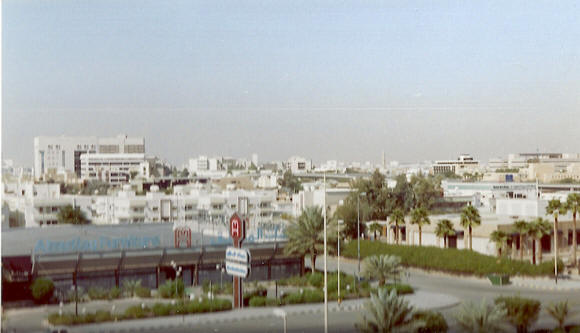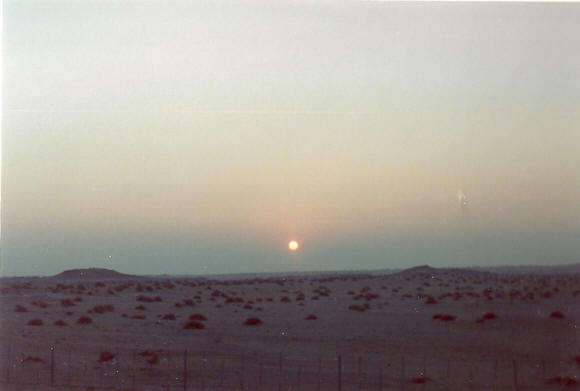|

ON MY
FIRST DAY of posting to Gulf War I arrived at
Headquarters British Forces Middle East (HQBFME) and
reported on arrival to the Chief of Staff, Col Ian
Talbot (Google him, it’s interesting). He had no idea
whatsoever that I was joining his staff and told me not
to bother unpacking as he thought I should join 1 (UK)
Armoured Division (1(UK) Div) in the field up country.
Two hours later he changed his mind and told me I was
staying. This set the pattern for the rest of my war
(see “cake and arse party” in previous episodes).

View from the roof of HQBFME
The first
few weeks were a bit of a “sitzkrieg” or phoney war as
the coalition forces built up in theatre and moved from
the ports of entry inland. The logistical effort was
staggering. At this point, being “weapons trained” –
that is trained in the design and acquisition of
weaponry – I joined Lt Col James Short, of the 9/12
Lancers I think, who had the unenviable task of dealing
with all the multifarious demands for new equipment
being made.
The fact that the Saudis and Kuwaitis were paying
allowed every Tom, Dick and Harry to exercise their
personal equipment aspirations and hobby-horses and
requests for “vital” kit was never-ending. It amused me
that we had been ready to take on the massed Soviet tank
armies with our kit as it stood, but now that we were
facing the third world force that was the Iraqi army
everything had to be up-armoured and enhanced.
Some of the more arcane equipment that I was involved in
procuring included knobby tyres for motorcycles, to give
them more traction in the sand, and smoke artillery
rounds for our 155mm artillery pieces. The only country
that could supply the latter was South Africa, which at
the time was still an international pariah because of
apartheid, but it didn’t seem to stop us buying
ammunition from them. (As it happened the war was over
before the smoke rounds arrived).
So much kit was sent to the Gulf that we lost track of
much of it. There was no asset tracking system in place
as far as I’m aware and stuff got lost. Some of the
containers were never opened at all, and the units up
country got so fed up waiting for their bits and pieces
that they sent people back to find what they needed,
which only added to the confusion. More awkwardly, we
lost a consignment of then top secret Chobham armour for
about 48 hours, a panic which ended when it was
discovered on the edge of some airstrip somewhere and
immediately put under close guard. If only the logistics
staff had thought to barcode everything we’d probably
have been all right, but they didn’t.
During this time when the coalition forces were building
up in theatre there were, I’m afraid to say, three main
bones of contention which sowed dissent and envy amongst
the troops. The aforementioned expenses paid to us rear
area oxygen thieves (aka “REMFs”, which I will not
expand upon in a family-friendly journal) ranks first
and foremost of these. Details are in the previous
episode, but their generosity bordered on the ludicrous,
and we only got them thanks to the RAF’s innate ability
to screw every situation to their own advantage to the
nth degree. They didn’t last long, but the boys in the
desert were peeved by them, put it that way, and rightly
so. The BFPO outside in the yard was handling £250,000
per week as we all banked our allowances which gives
some indication of the sums involved.
Next was the allocation of cars within HQBFME. As I
wrote in the last episode, I picked up a brand new Mazda
929 with 23 miles on the clock when I arrived, and most
folk would have been quite satisfied with that. However,
more senior officers were forever bickering over what
level of car they should be entitled to. On one famous
occasion I borrowed a Land Rover Discovery to visit
Divisional HQ in the desert, and when I returned there
just happened to be a wheen of senior officers in the
car park who immediately demanded to know how I was
entitled to that particular motor, and then proceeded to
berate their junior staff officers as to why they didn’t
have one as well. It was truly pathetic.
But the biggest furore of all was over the issue of
desert combat uniforms. The boys of 7 Armd Bde had
managed to get themselves kitted out in desert
appropriate clothing, with sand camouflage combats,
desert boots, shemaghs and the like. They even got the
rare sand “woolly pully” which was the mark of the
ancien combatant and the object of envy for many
Johnny-come-latelies like me. But then supplies ran out,
and the rest of us turned up in our temperate green and
brown combat kit (main photo) which marked us out as the
new boys in town.
The issue of the next batches of desert combats became
an issue – or not an issue (see what I did there?) So
when the Chief of the General Staff (CGS), General Sir
John Chapple, came out to visit us as he absolutely
should have done, some idiot on his staff decided it
would be a good idea to kit him and his entourage out in
brand, spanking new desert combats whilst the troops in
the field had none. I swear it looked as if his ADC had
ironed the General’s outfit too, which added insult to
injury. It was a PR faux pas par excellence.

Desert sunrise
However,
the murmurings of discontent from the ranks were
somewhat alleviated when the DCOS of HQBFME, a Colonel
in the Logistic Corps who was responsible, amongst a
myriad of more important items, for the distribution of
said desert combats, declared that he would be the last
man in theatre to get a set. He was true to his word and
was the last British soldier dressed in green in
theatre. We were impressed.
With such things the tail end of 1990 passed slowly and
soon we found ourselves in the Festive Season but a long
way from home. After getting over our outrage that the
Permanent Joint Headquarters (PJHQ) back at Northwood in
the UK had gone on to skeleton manning for the period
(“Skeleton manning? Don’t they realise a war is about to
begin?”), we were invited by British diplomats to spend
Christmas Day with them in the diplomatic quarter in
Riyadh, which was most kind of them.
It was as jolly as could be in the circumstances, and
they had even got some Christmas presents for us, which
was very touching. And, given diplomatic privileges,
they could serve alcohol too, which we had been more or
less deprived of since we arrived in Saudi. Of course it
went straight to our heads and we became unco’ fu’. But
we drove home afterwards nonetheless, reasoning that a
state which banned alcohol would have no need for drink
driving laws and therefore we were quite safe from
prosecution. And the driver went on to become a
Brigadier in later life!
We did get sent alcohol from back home, of course,
despite many warnings that we were breaking Saudi law.
At first it came surreptitiously, disguised in shampoo
bottles and marked accordingly on the customs forms.
Trouble was that the WAGs who sent it never rinsed out
the containers well enough, and so the Glenmorangie so
transported tasted like Head ‘n’ Shoulders. Then someone
brazenly sent me some marked “whisky” on the outside of
the package and it arrived safely and without mishap.
After that we were all much more relaxed, both mentally
and physically. Lots of us had lost our taste for it,
though, so there was little over-indulgence that I knew
of in HQBFME.
The other great advantage we had over the boys in the
desert was a facility we called “Freefone Saudi Arabia”.
Basically the phones in the HQ had no barriers to
private use and were open to international calling.
During the nightshift, in particular, there were long
hours of boredom which could be pleasantly alleviated by
calls to friends and family back home. We spent quite
literally hours talking to friends and relatives, all
courtesy of the Saudi government. Word got out, and our
chums in the field would call us on the military net and
ask us to call up their WAGs to tell them that they
were, so far at least, safe. We were of course happy to
oblige.
And that was about it. The New Year of 1991 arrived and
we found ourselves many miles from home without any real
clue what was coming next. That, however, was all about
to change, and the events that unfolded will be covered
in the next couple (or possibly three) episodes.
To come in Part 22; the ‘fun’ starts. |

